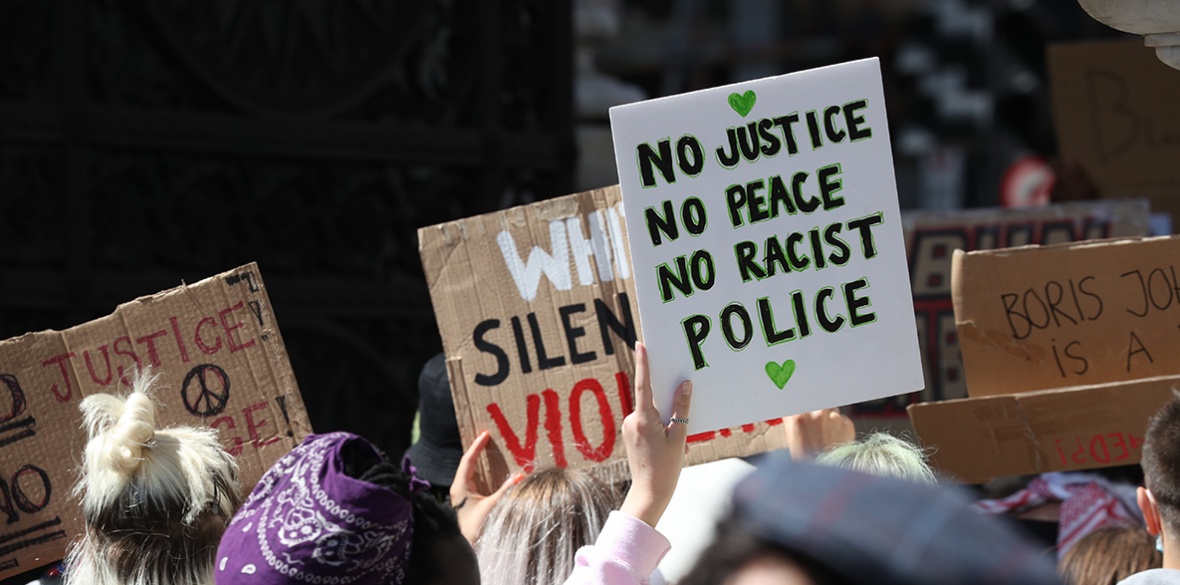This is the last article you can read this month
You can read more article this month
You can read more articles this month
Sorry your limit is up for this month
Reset on:
Please help support the Morning Star by subscribing here
SHOCKING footage of police punching a restrained black teenager in north London’s Haringey has sparked an immediate community response.
Those marching on Tottenham police station to demand action against rogue officers will not be satisfied with appeals from the Met not to jump to conclusions.
While the force’s public statement gives no detail as to why the individual was restrained in order to be searched, black communities are well aware that your chance of being stopped and searched by police is almost 10 times higher if you are black than white – while black people are 40 times more likely to be searched under Section 60 powers, which do not require “reasonable suspicion” on officers’ part that a crime is about to be committed, or that the person searched may be carrying a weapon.
Tottenham was, of course, the epicentre of riots that spread across London and beyond in 2011 following the police killing of Mark Duggan, official accounts of which remain unsatisfactory nine years on, with human-rights group Forensic Architecture calling for a renewed investigation just over a year ago because the witness testimony regarding Duggan’s shooting is inconsistent.
Authorities would be unwise to assume that the grievances expressed then are any less acute today.
The British state response to the 2011 unrest was exclusively repressive: those accused of disorder were fast-tracked through all-night court sittings in a drive to issue accelerated summary “justice” presided over by then director of public prosecutions Keir Starmer, who famously made a 4am magistrate’s court visit to boost judicial morale.
While Starmer praised the courts for their “efficient” response, less high-powered lawyers reported “prisoners crammed three to a cell with no toilet facilities” in the rush to process cases and luckless individuals were handed six months behind bars for taking bottled water from a ransacked supermarket.
The deprivation that gave rise to that explosion has not become less severe in an ensuing decade of crippling austerity that starved local authorities of funds, shuttering community assets from youth clubs to libraries, and witnessed a mushrooming of super-exploitative, insecure work in the so-called “gig economy.”
Nor will resentment of state racism have softened over the years in which Theresa May constructed the “hostile environment,” resulting in the outrageous deportation of black British citizens in the Windrush scandal, or following the subsequent installation of a disgraced journalist with a long record of race-baiting rhetoric in 10 Downing Street.
Indeed, coronavirus has intensified racial oppression. In the first lockdown black and ethnic-minority people were 54 per cent more likely to be fined for breaching restrictions.
The Office for National Statistics (ONS) found that black people are four times more likely than whites to die from Covid-19.
Its analysis also demolished the idea that this might be linked to genetic vulnerabilities, finding instead that “the difference in the risk of Covid-19 mortality between ethnic groups can be explained by demographic, geographical and socioeconomic factors,” according to ONS official Ben Humberstone.
In other words, black people are more likely to die because of the jobs they do and the places they live.
This structural racism will not be addressed by unconscious bias training or mouthing formulas about racial awareness. It requires a community-rooted anti-racist movement, one that draws its strength from mobilising the oppressed themselves and challenges the role that racism plays in the maintenance of capitalist exploitation of all workers.
No such movement is likely to find an expression in “official” politics given the hostility of Labour’s new leadership to all forms of politics from below.
But the Black Lives Matter movement that swept the world following the police murder of George Floyd in the United States has demonstrated a reach and a dynamism that delivers results.
The horrific footage from Tottenham reminds us that building an effective anti-racist movement is as necessary here as across the Atlantic.










